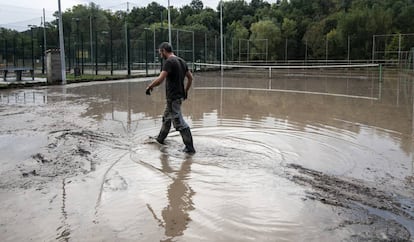New weather warning as east of Spain braces for worst “cold drop” in 10 years
The phenomenon, caused by the arrival of very cold polar air, is expected to bring 180 millimeters of rain in 12 hours, affecting Catalonia, Aragón, Valencia, Andalusia, Balearics and Murcia


More extreme weather has been forecast for Spain just days after tropical storm Leslie swept across the country and flash flooding in the Balearic Islands left 13 people dead in Mallorca, including a British couple and two German nationals.
Spain’s national weather service AEMET has issued a special warning for “rain and intense, generalized and persistent storms” for the eastern side of the peninsula and the Balearic Islands. The extreme weather is expected to hit on Thursday and last until Sunday.
The weather conditions will create “a cocktail of strong, persistent and intense rain”
While the gota fría – literally “cold drop,” a term used in Spain to describe a sudden fall in temperatures along the east coast caused by the arrival of very cold polar air – is “typical” of Spanish falls in the Mediterranean, AEMET spokesperson Rubén del Campo says a drop of this intensity has not occurred since October 2008.
Aragón, Catalonia, Valencia, Andalusia, the Balearic Islands and Murcia will be the worst-hit regions in Spain and a red alert – the highest on the scale – has been issued for Castellón on Thursday and Friday.
According to Del Campo, the extreme weather is due to two low pressure areas. “The first will move to the south of the Peninsula this Thursday while the other will be in the Mediterranean and near the Balearic Islands,” he explains.
Both low-pressure zones can bring torrential rain but by “interacting and joining together” they cause “instability” in the upper layers of the atmosphere and lead to storms and “humid wind along the length of the Mediterranean Sea,” says Del Campo. These ingredients create “a cocktail of strong, persistent and intense rain,” he says.
According to Del Campo, cold drops are “inherent to Mediterranean weather in the fall” but have been “noticeably absent” from previous seasons, with the last one occurring a decade ago.
What’s “most important” about this cold drop is its persistence, with downpours expected to last for hours without ceasing, and the volume of rain forecast to fall. “More than 100 millimeters could fall in 12 hours in many areas in the Mediterranean and the Balearic Islands,” says Del Campo.
A cold drop of this intensity has not occurred since October 2008
The north of Castellón will be the worst-affected area with 180 millimeters expected to fall on Thursday and Friday. A red alert for extreme risk has been issued for the area between Thursday afternoon and midday on Friday.
An orange alert for “significant risk” has also been issued in Granada, Málaga, Teruel, Girona, Tarragona, Valencia and the Balearic Islands of Ibiza, Formentera and Mallorca. “Up to 150 millimeters of rain are expected to fall in 12 hours in the Valencia region,” says Del Campo, who warned the downpours could reach the level of torrential rain – 60 millimeters in an hour.
Almería, Córdoba, Huelva, Seville, Cuenca, Barcelona, Alicante, Badajoz and the Balearic Island of Menorca have also been issued a yellow alert – the lowest on the scale – for the extreme weather.
On Saturday, October 20, the low-pressure area will move to the southeast and from Sunday AEMET forecasts that the cold drop is likely to ease, although its trajectory is still uncertain.
Rain and storms are also forecast for the rest of the peninsula but they will not have the same “great persistence” as those in the eastern Mediterranean. AEMET issues alerts three days in advance and changes the warnings throughout the day. The weather service has reminded the public to stay updated on the changing status of the alerts.
English version by Melissa Kitson.
Tu suscripción se está usando en otro dispositivo
¿Quieres añadir otro usuario a tu suscripción?
Si continúas leyendo en este dispositivo, no se podrá leer en el otro.
FlechaTu suscripción se está usando en otro dispositivo y solo puedes acceder a EL PAÍS desde un dispositivo a la vez.
Si quieres compartir tu cuenta, cambia tu suscripción a la modalidad Premium, así podrás añadir otro usuario. Cada uno accederá con su propia cuenta de email, lo que os permitirá personalizar vuestra experiencia en EL PAÍS.
¿Tienes una suscripción de empresa? Accede aquí para contratar más cuentas.
En el caso de no saber quién está usando tu cuenta, te recomendamos cambiar tu contraseña aquí.
Si decides continuar compartiendo tu cuenta, este mensaje se mostrará en tu dispositivo y en el de la otra persona que está usando tu cuenta de forma indefinida, afectando a tu experiencia de lectura. Puedes consultar aquí los términos y condiciones de la suscripción digital.








































